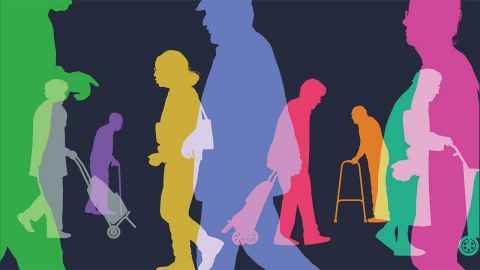The invisible New Zealanders
25 May 2022
OPINION: The 2022 Budget and the health reforms are conspicuously silent on an over-looked group of New Zealanders, older people, write Ngaire Kerse and Lynne Taylor.

Many thousands of words have been written and uttered about the health reforms and the 2022 Budget, but precious few have mentioned the invisible New Zealanders.
They are invisible because they are largely silent, having come of age in a generation thankful for small mercies and suspicious of grand gestures. We are talking about older New Zealanders.
Older people hold our wisdom, contribute to society, families and whānau in many ways and we cherish them. For decades New Zealand has known that our population is ageing. But over the course of those decades, we have not done nearly enough to prepare for what is coming. In less than 10 years about 20 per cent of New Zealanders will be older than 65. In around 20 years, there will be 386,000 New Zealanders older than 85 and more than half of them will experience life in a residential care facility.
Ask anyone in the aged care sector and they will tell you that the cracks are already showing. New Zealand’s Covid-19 strategy has been a success. It does not bear thinking how our hospitals would have coped if the spread of Covid had not been delayed until we had achieved high vaccination rates.
Unlike Covid, the dignity, health and well-being of older New Zealanders lacks the drama of urgency. There will be no patients left untended in corridors, or ambulances ramped up waiting to unload patients at emergency departments.
But this does not make it any less of an emergency and moral imperative to ensure our oldest citizens do not continue to suffer the indignities and consequences of poorly delivered health services. The scale of this issue is going to keep growing unless the health system and country acts now.
Research has long identified gaps in health and well-being for older people. Those living in aged residential care facilities are there because they need 24/7 assistance for daily activities like dressing, mobility and eating.
But the contracts district health boards set with aged residential care facilities specifically exclude a range of health services from oral health, audiology, physical therapy, podiatry and optometry. Yet these kinds of impairments, alongside the decline in cognition, are precisely why older people are in aged residential care.
They rely on the residential staff to maintain their health and well-being. But a registered nurse, a GP visit and the administrations of care staff with heavy workloads and underpaid compared to counterparts elsewhere in the health sector, cannot realistically assess and manage multiple health needs.
The result is a significant and unnecessary decline in quality of life. The proportionately fewer Māori in aged residential care are also evidence of enduring systemic inequity. We know the few services that are available in the community are much less likely to be accessed by Māori.
The 2022 Budget does not signal any sense that the enormity of the crisis has been grasped, let alone, considered as cause for nationwide, coordinated and revolutionary change.
The 2022 Budget does not signal any sense that the enormity of the crisis has been grasped, let alone, considered as cause for nationwide, coordinated and revolutionary change.
Specific Budget 2022 items for older New Zealanders include the continuation of the SuperGold card and relatively small investments in programmes aiming to support digital inclusion, senior entrepreneurs and shared housing, and trials on better support for people diagnosed with dementia.
But there is no grand vision to respond to how we should take better care of our oldest people.
Across the Tasman, Australia has begun to respond to the issue. In 2020 a Royal Commission into aged care delivered an interim report called Neglect, calling for an overhaul of the aged care sector. The interim report said the country’s aged care sector was a ‘shocking tale of neglect’.
Accompanying the release of the Commission’s final report, commissioner Lynelle Briggs said that one in three people accessing residential aged care and home care experiences had a substandard experience.
The Royal Commission report catalogues a distressing series of failings and charged the Australian Government with failure in its responsibilities to its older citizens. The report said state of the aged care sector ‘diminishes Australia as a nation.’
New Zealand’s health reforms aim to be people-centred, equitable, accessible and cohesive. We can only hope that these aspirations are applied to the aged care sector as soon as possible. Without concrete policy, proper funding and actions, New Zealand will head down the same path as Australia.
We need to do better and for the sake of the many thousands of older New Zealanders already experiencing the deficiencies and indignities from poor health care and the many, many more who will soon discover this, we need to do this now.
Professor Ngaire Kerse holds the Joyce Cook Chair in Ageing Well at the Faculty of Medical and Health Sciences at the University of Auckland.
Dr Lynne Taylor is senior research fellow in general practice and primary health care at the School of Population Health at the University of Auckland.
This article reflects the opinion of the authors and not necessarily the views of the University of Auckland. Used with permission from Newsroom.
Media contact: Gilbert Wong gilbert.wong@auckland.ac.nz